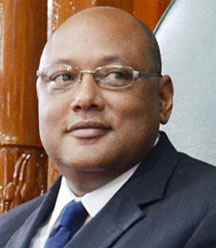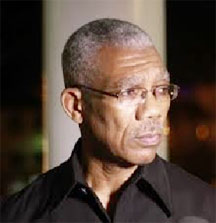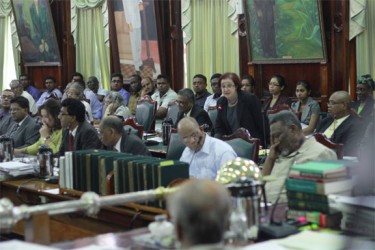The significance of the outcome of the November 2011 general elections – at least as far as the electorate was concerned – reposed in what we describe as the “one seat majority,” that is to say the single-seat numerical advantage which the parliamentary opposition holds over the executive in the National Assembly.
The public line of reasoning was that we had, for the first time as a nation, arrived at a place where the political party in office no longer held independent sway in the matter of the creation of legislation and, by extension, in the governance of our country. That, apart from the manner in which elections had previously been conducted, was much of the reason why our democratic credentials had continually been questioned. The ‘one seat majority,’ many Guyanese reasoned, could settle some critical issues relating to the practice of democracy in Guyana.
The people had every right to hope even though that hope was, in so many instances, laced with skepticism. They had, over time, endured the sobering lessons taught by an unchanging political culture and if they were hopeful they were also apprehensive. about whether that historic general elections outcome would bring historic change.


We had begun to get some pretty clear answers to that question long before the second anniversary of the nation’s 10th Parliament. It had begun with a fierce political confrontation over which side of the House would hold the Speakership of the National Assembly and, up to the time of writing had reached a juncture of yet another of our unending political ‘bloodfeuds’ over a piece of legislation on money-laundering. Since December 2011, the National Assembly has stumbled its way through one faceoff after another, sending unmistakable signals to the populace that the fault lines that have deformed our politics for decades are still far from healed.
The PPP/C might probably deny that it saw the loss of its majority in the House as a political disaster, a loss its ability to fashion and pass laws without parliamentary ‘hindrance;’ and yet, that is precisely the case. By the same token, the political opposition can hardly honestly deny that much of the significance of the one seat majority reposes in the purpose it serves as a bargaining chip, a tool with which to wring concessions out of the executive as it sees fit, or else to frustrate the government when the political circumstances so dictate. That is the realm in which our politics have always belonged.
So that the din about ‘snap elections’ really had nothing to do with “the will of the people.” The people had already spoken a little while earlier. The problem was that what they had said had not been pleasing to the People’s Progressive Party/CIVIC administration. “Snap elections” was really a matter of putting words in their mouths. Talk about snap elections bore a curious resemblance to a rejection by the government of the mandate that it had been handed by the people in November 2011 to rule, in the manner that the people had seen fit.
By the same token the political opposition came to terms with the fact that while the people had again said ‘no’ to its application to govern, it had, for the first time, placed in its hands the ability to meaninfully influence the legislative process and, if it so choose, to cramp the government’s style – so the speak – as far as running of the affairs of the country is concerned. It was the closest that its advocacy had brought it to its goal of “shared governance.”
The ensuing state of affairs in the National Assembly – termed gridlock in some quarters – is really an exercise in gamesmanship of the most public sort and in a manner which, while sometimes seeming to have little to do with “the business of the people,” but really has to do with the business of power.

What the November 2011 ‘one seat majority’ did was to supplant the routineness of the governance culture that had obtained since independence with a potentially more meaningful one…one that facilitates a more genuinely broad-based participation in the process of making decisions for our country. That, however, would only work if our Parlia-ment genuinely embrace the will of the people. On the basis of the prevailing evidence our political leaders are still light years away from beginning to clean the Aegan Stables of prejudice, narrowness and a preoccupation with power. They are not ready to embrace the will of the people.









